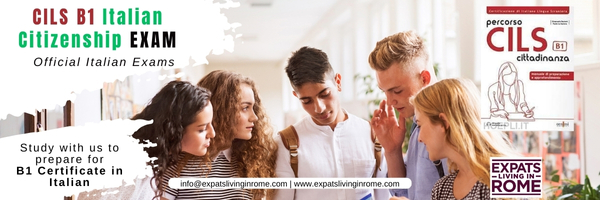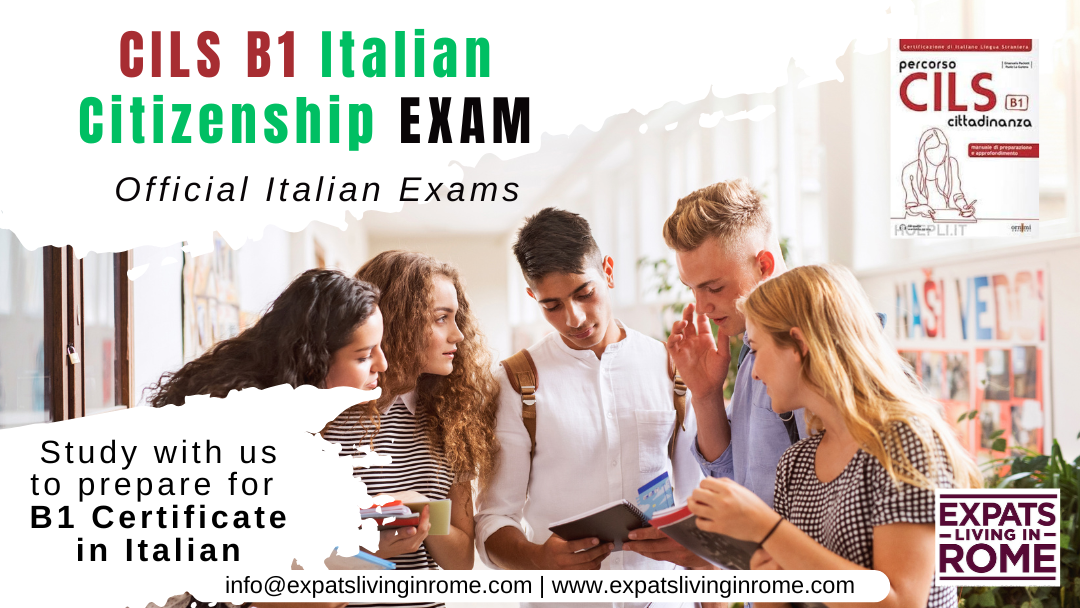How to Obtain the B1 Italian Certification for Citizenship
by Adriana ruiz
If you’re an expat living in Italy or a foreigner planning to move and apply for Italian citizenship, you might have heard about the B1 Italian Certification. This language requirement is crucial for those seeking naturalization.
Who Needs the B1 Italian Certification?
The B1 level Italian language certification is required for foreigners applying for Italian citizenship through marriage or residency (naturalization). This requirement was introduced in December 2018 under Law 132/2018 to ensure that new citizens can effectively integrate into Italian society.
Who Must Take the Exam?
• Applicants for Italian citizenship by marriage (after being married to an Italian citizen for at least two years, or one year if living in Italy and having children together)
• Applicants for Italian citizenship by residency (after legally residing in Italy for 10 years)
Who Is Exempt?
• Those who have a long-term EU residence permit (permesso di soggiorno UE per soggiornanti di lungo periodo), as they already demonstrated language proficiency.
• Individuals who have an official diploma from an Italian school or university.
• Those with severe disabilities or conditions preventing them from taking a language exam.
What is the Structure of the B1 Italian Exam?
The B1 exam evaluates a candidate’s ability to understand and communicate in everyday Italian. It follows the Common European Framework of Reference for Languages (CEFR) and consists of four main parts:
• Listening Comprehension – Understanding spoken Italian, such as conversations and announcements.
• Reading Comprehension – Understanding short texts, articles, and advertisements.
• Writing – Writing a short text, email, or letter in Italian.
• Speaking – Engaging in a short conversation on common topics.
To pass, you must score at least 60% overall, with a satisfactory performance in all sections.
Where Can You Take the B1 Italian Exam?
You can take the exam at officially recognized institutions, such as:
• Università per Stranieri di Perugia (CELI)
• Università per Stranieri di Siena (CILS)
• Società Dante Alighieri (PLIDA)
• Università Roma Tre (CERT.IT)
These institutions offer B1 certification specifically for citizenship, so make sure you choose the correct exam format (some versions are easier than others).
How to Prepare for the B1 Italian Exam?
• Take an Italian language course – Many schools in Italy and online offer B1 preparation courses. Check out our course.
• Practice with past exam papers – Many official exam centers provide past tests to help candidates prepare.
• Improve your listening skills – Listen to Italian radio, podcasts, or watch TV shows with subtitles.
• Speak as much as possible – Join Italian conversation groups, practice with native speakers, or use language exchange apps.
• Write short texts daily – Try composing emails, journal entries, or social media posts in Italian.
Documents Needed to Register for the Exam
To take the B1 certification exam, you’ll typically need:
• A valid passport or residence permit (permesso di soggiorno if in Italy)
• A completed application form from the exam institution
• Proof of exam fee payment (varies but is usually around €100-150)
The B1 Italian Certification is an important step for expats and foreigners who want to obtain Italian citizenship. It ensures that new citizens have a basic command of the language, aiding their integration into Italian society. If you’re planning to apply, start preparing early and take advantage of the many resources available to help you succeed.
If you need help with your citizenship process, language courses, or general expat life in Italy, email us at [email protected].

Single Female Travelers in Italy: Practical, confident, and connected
Rome rewards curiosity and courage. This guide offers grounded tips, cultural insight, and community support so you can explore with confidence—day and night, solo and on your own terms. Start with confidence “Solo doesn’t mean alone.” In Rome, you’ll find friendly locals, layered history, and a vibrant expat network. A little preparation goes a long […]

Christmas in Italy 2025: A Magical Season for Expats Across Italy
Christmas in Italy isn’t just a holiday — it’s a season full of history, flavor, celebration, and heartfelt traditions that bring families, towns, and entire regions to life. Whether you’re an expat experiencing your first Italian Christmas or a returning fan of the magic, 2025 promises some beautiful celebrations across the country. Here’s what to […]

Tax Residency Incentives in Italy — Your Guide (2025)
Italy offers several tax incentives designed to attract retirees, entrepreneurs, high-net-worth individuals and remote workers. These regimes can be extremely generous — but they are complex and often conditional. This guide explains the main options in 2025, who qualifies, and how we can help you plan a compliant move. Why Italy Offers Tax Incentives Italy […]

Navigating Healthcare in Rome: A Guide for Expats with English-Speaking Doctors
Moving abroad is exciting, that is until real life hits. I came to Italy from Alaska in 2021 for what was supposed to be a four-month study program in Florence. Four years later, I’m still here, now living and working in Rome. When we plan our dolce vita, we think about pasta, museums filled […]

Major Tax Incentives for Home Renovation in Italy (2024-2033)
Taxpayers carrying out renovation work on residential buildings and common areas of residential complexes in Italy are entitled to claim significant tax relief. This benefit allows individuals to deduct a portion of the expenses incurred from their Italian personal income tax (Irpef). This article outlines the rules, beneficiaries, and changing deduction rates for these home […]

How to Save on Taxes When Buying Your First Home in Italy
Buying a first home in Italy comes with significant tax benefits and incentives designed to make property ownership more accessible. Whether you are an Italian national or a foreigner, understanding these advantages can translate into substantial savings on your property purchase. The “Prima Casa” regime is essentially a set of tax reliefs applicable to the […]

Bringing Your Family to Italy: A Guide for Non-EU Citizens
For non-EU citizens residing in Italy, having your family with you is a tangible goal. Italian law provides a framework for family reunification, allowing you to bring close relatives to live with you under specific conditions. This guide outlines the key requirements, procedures, and rights to help you navigate the process. Who Can Apply for […]

How to Become a Self-Employed Worker in Italy
Are you a non-EU citizen wishing to work as a self-employed worker in Italy? This guide explains the conditions you must meet, the procedures to follow, and the rights you can enjoy during your stay. Conditions for Self-Employment To legally engage in independent work in Italy, non-EU citizens must satisfy several conditions and obtain the […]








